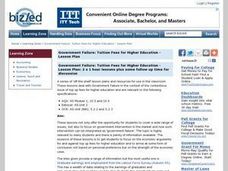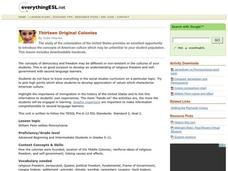National Endowment for the Humanities
James Madison: Raising an Army—Balancing the States and the Federal Government
To war! To war! Every nation in the history of the world has had to deal with warfare on some level. Scholars go through a series of activities and discussions surrounding the development of the Constitution to help them better...
Curated OER
European Union Governance
Become familiar with the structure and functions of the European Union. As they conduct internet research, young historians use an attached worksheet to categorize the five main institutions of the EU. A flowchart worksheet also gives...
Curated OER
Limited v. Unlimited Government
Students compare and contrast the characteristics of a limited and unlimited government. In groups, they use this information to create a chart and write a description of how leaders are chosen in each. They share their information...
Curated OER
Lessons from the Holocaust
Students discover what a dictatorship is by examining the holocaust. In this government activity, students discuss the laws that were enacted for Nazis to take control of Germany, and the types of laws we have put place to prevent...
National Endowment for the Humanities
Lesson 4 James Madison: Internal Improvements Balancing Act—Federal/State and Executive/Legislative
Who has the power? The founding fathers asked the same question when the United States was formed. Learners explore issues that arose during Madison’s presidency that raised constitutional questions. Through discovery, discussion, and...
National Endowment for the Humanities
Lesson 2 James Madison: The Second National Bank—Powers Not Specified in the Constitution
How much power is too much power for the federal government? Scholars use primary documents and constitutional research in groups to analyze the creation of the Second National Bank under James Madison. This is the second instructional...
Curated OER
Civic Engagement for Us?
Young scholars identify the different forms of civic engagement. They identify their responsibilities at the different levels of government. They also analyze young leaders running for office.
Curated OER
Identifying Career Interests in the Volunteer and Government Sectors
Here is a great way to give your class a real-life job experience, while also serving the community. They explore a variety of volunteer opportunities to build career interests, gain work experience, and help their community grow. This...
Curated OER
Linear Modelling of the Life Expectancy of Canadians
Middle and high schoolers explore the concept of linear modelling. In this linear modelling lesson, pupils find the line of best fit for life expectancy data of Canadians. They compare life expectancies of men and women, and find...
Curated OER
Organization of Fairfax County Government
Middle schoolers examine the various components of the Fairfax County government in Virginia. In groups, they describe the purpose of the Board of Supervisors and County Executive. They identify three constitutional officers and their...
Curated OER
Government Failure: Tuition Fees for Higher Education
Young scholars examine the concept of government failure. They analyze data to provide support for tuition fees. They write a report using their analytical and evaluative skills.
Curated OER
The Duties of Governments: Dix vs. Pierce
Students examine the role of Dorothea Dix on behalf of people with disabilities. They discuss President Pierce's veto of legislation she helped create. They address the rights and responsibilities of citizen's and the role of government.
Curated OER
Shape & Form
Learners analyze the difference between shape and form. They identify, explain and use the basic elements of design and determine that forms are three-dimensional and shapes are two-dimensional. They sketch it on their paper and then...
Curated OER
The Water Cycle
Fourth graders explore changes in water forms. In this water cycle lesson, 4th graders build a water cycle model and monitor it for 2 weeks in order to understand that water changes state as it moves through the cycle.
Curated OER
Thirteen Original Colonies
An outstanding lesson on the Thirteen Original Colonies, and the settling of Pennsylvania by William Penn is here for your learners. Valuable discussion takes place regarding how the colonies were settled, and some excellent handouts are...
Curated OER
Redistricting: Drawing the Lines
Difficult redistricting concepts are covered in a context that will make it understandable to your government scholars. They begin with a KWL on the term redistricting and then watch a video to answer some questions. They...
Curated OER
A Saturating Exponential
Your learners analyze the familiar model of a cold beverage warming when it is taken out of the refrigerator. The general form of the equation and its graph are presented. Learners learn about the specific pieces of the function by...
Curated OER
Citizen Me
Fifth graders examine what it means to be a citizen. Using the Constitution, they discover the functions and purpose of government. They compare and contrast the difference between a democracy and a monarchy. As a class, they discuss...
Curated OER
Accounting -- Forming and Solving Business Organizations
High schoolers review what a proprietorship is and the advantages and disadvantages of it. In groups, they examine the ways to form and dissolve a proprietorship. To end the lesson, they review what a corporation is, its advantages and...
Curated OER
What is the Average Height of Your Class?
For this statistics lesson, learners use an on-line form generator create a class-specific form, then complete the form, view a graph and data analysis, and draw conclusions.
Curated OER
Issues Close to Home
Students brainstorm as a class about their role in the local government. In groups, they use various types of media to discover how it is affecting their lives. They choose one issue and state their position to share with the class. To...
Curated OER
The Fed is Protecting Your Money
Students are introduced to the role of the Federal Reserve. In groups, they discover the three functions of money and discuss the most common forms of payment used in society today. They develop a survery to give to the local community...
Curated OER
Mountains "Fold, Fault, Erupt, and Erode"
Fifth graders conduct an experiment to demonstrate the folding and rippling of rock to form a mountain. They identify mountain chains on a map, participate in the demonstrations, and define folding fault block, igneous eruptions, igneous...
Curated OER
Respect for Authority
Young scholars examine the country of Mongolia and how it is trying to form a democracy. As a class, they participate in a class meeting about a new class rule and they voice their opinions. They read excerpts of a letter of a Peace...
Other popular searches
- Compare Forms of Government
- World Forms of Government
- Ancient Forms of Government
- Four Forms of Government
- Forms of Government Rating=3
- Many Forms of Government
- Forms of Government 2nd
- Forms Government Lesson Plans
- Different Forms of Government
- Forms of Government Intervent
- Greek Forms of Government
- Forms of Government Inter Vent























